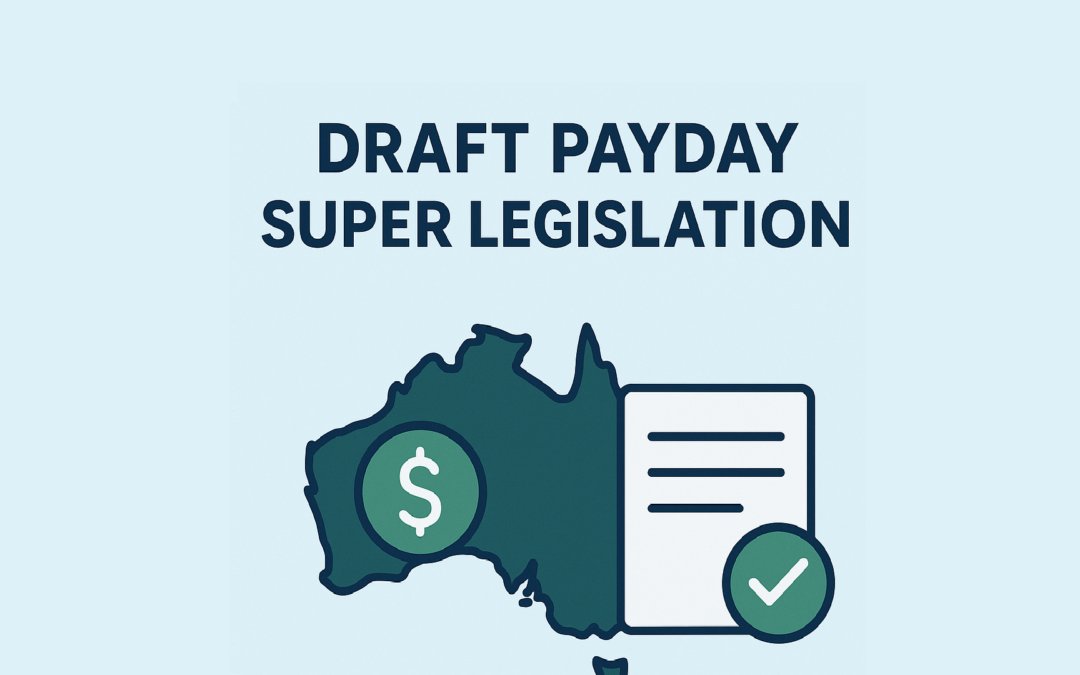Payday superannuation is set to be one of the most significant reforms to Australian superannuation law in recent years. Under draft legislation released in March 2025, employers will be required to make superannuation contributions at the same time they pay wages to their employees. These changes are part of the Albanese Government’s Securing Australians’ Superannuation Package, announced in the 2023–24 Federal Budget.
Subject to the passage of legislation, the new payday superannuation requirements will come into effect on 1 July 2026. The aim is to address persistent problems with unpaid or underpaid super, which can result in significant long-term impacts on workers’ retirement outcomes. Accordingly, an industry consultation period was held between 14 March and 11 April 2025.
Why Payday Superannuation?
Currently, employers are only required to pay superannuation contributions on a quarterly basis. While many do so more frequently, this system can lead to delays in employees receiving their entitlements and creates opportunities for non-compliance, because of the more limited deterrents for non-compliance.
Unpaid or underpaid superannuation is increasingly recognised as a form of wage theft. According to the Federal Treasurer, Jim Chalmers MP, the new system could result in a 25‑year‑old median-income earner being approximately $6,000 better off at retirement, assuming they currently receive quarterly contributions but are paid fortnightly. These figures act as an illustration of just how significant the overall difference for Australian workers could be under the new system.
Key Features of the Reform
- Superannuation Paid on Payday
From 1 July 2026, employers will be required to pay Superannuation Guarantee (SG) contributions at the same time they pay Ordinary Time Earnings (OTE) to employees. Each payment of wages will trigger a corresponding SG obligation and subsequently a duty to pay within the given period..
To allow for clearing house processing times and other administrative steps, employers will have up to 7 calendar days from the date of each OTE payment to ensure the superannuation is received by the relevant fund. This is a departure from the quarterly regime and places increased responsibility on employers to maintain up-to-date compliance.
- Exceptions to the 7-Day Rule
The draft legislation includes some limited exceptions:
- Employers will have 14 calendar days to make superannuation payments for new employees, to accommodate onboarding delays.
- If a contribution is made to a stapled fund (as notified by the Australian Taxation Office) and is rejected, employers will have 42 days to rectify.
- Out-of-cycle earnings such as commissions, bonuses, advances and back payments can be paid with the next OTE payment.
- Changes to the SG Charge
Late or unpaid contributions will attract a revised Superannuation Guarantee Charge (SGC). The update regime aims to:
- Ensure employees are in the same financial position as if contributions were paid on time.
- Encourage employers to promptly disclose and correct any underpayments.
- Escalate consequences for repeated failures, including higher penalties.
Under the new system, late contributions will automatically count toward the earliest payday with an unpaid shortfall. This eliminates the current election system that allows employers to nominate the quarter to which a late payment applies.
For full details on the new SGC rules, refer to the factsheet or the draft legislation on the Treasury’s website.
Supporting System Changes
To support the transition, the following systemic changes are also planned:
- The current 20-day window for super funds to allocate or return contributions will be reduced to 3 days.
- Employers will be able to show new employees their existing stapled fund, helping reduce the creation of multiple accounts. Only MySuper products that pass performance tests may be promoted during onboarding.
- From 1 July 2026, the Small Business Superannuation Clearing House will be retired, reflecting advances in payroll software that enable all real-time super payments.
- Payments will be enabled through the New Payments Platform, improving error resolution and processing times.
ATO Compliance and Visibility
The ATO will have enhanced capacity to enforce compliance through increased visibility of superannuation payments. By cross-referencing employer Single Touch Payroll data, the ATO will be better positioned to identify missing or late payments and intervene early to protect employee entitlements.
Key Takeaways
The payday superannuation reforms are a major step toward improving retirement outcomes for Australian workers and strengthening employer accountability. With the implementation date of 1 July 2026 now only 12 months away, businesses should begin reviewing their payroll systems and processes to ensure they will be ready for the shift to payday-based super contributions.
Employers who rely on clearing houses or manual processes should especially consider moving to payroll software that supports real-time super payments. Proactive planning will reduce compliance risks and ensure a smoother transition when the new rules take effect.
For further advice on the changes or to discuss our full range of services, please contact our team.
Phone: (02) 9181 5001
Email: [email protected]
Our Services: https://integroe.com.au/legal-services/

